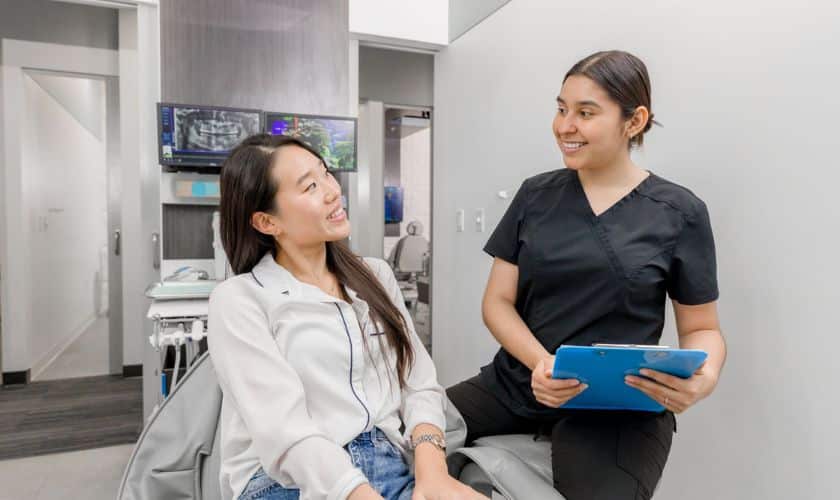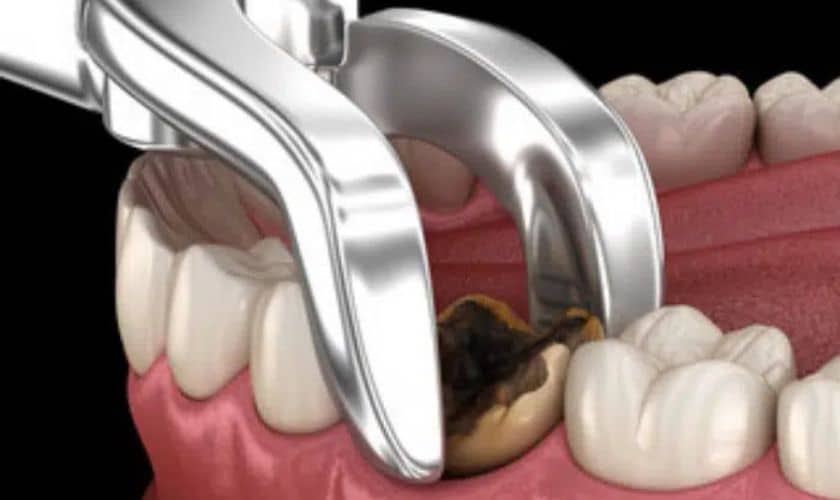Pearl Dental Blog

The Dos and Don’ts of Pre-Extraction Dental Care
Preparing for a tooth extraction involves more than just the procedure itself – proper pre-extraction dental care is crucial. By understanding the dos and don’ts, you can pave the way for a smoother process and quicker recovery. This article explores essential guidelines to follow before undergoing a tooth extraction. From managing medications and informing your dentist about your health history to avoiding certain foods and following oral hygiene practices, these steps play a pivotal role in minimizing risks, promoting healing, and ensuring a successful extraction outcome. Let’s delve into the dos and don’ts that empower you to approach your extraction with confidence.
Dos: Taking the Right Steps
A. Consultation with the Dentist
1. Essential Assessment: Scheduling a consultation with your dentist before the extraction is crucial. It allows the dentist to assess your overall oral health, discuss any existing medical conditions, and review your medications. This assessment helps determine the best approach for the extraction, taking into account potential risks and complications.
2. Informed Decision-Making: The consultation provides an opportunity for you to ask questions and understand the procedure thoroughly. Sharing your medical history and current medications ensures that the dentist can make informed decisions to tailor the extraction process to your specific needs. This collaborative approach promotes a smoother extraction experience and reduces the likelihood of post-extraction complications.
B. Follow Professional Advice
1. Optimal Healing: Adhering to the dentist’s instructions is essential for a successful extraction and proper healing. Prescribed antibiotics or medications, if any, help prevent infection and manage pain, ensuring a smooth recovery process.
2. Minimizing Risks: Dental professionals provide advice based on their expertise and your specific condition. Following their guidance on activities to avoid, proper oral care, and dietary restrictions minimizes the risk of complications such as infection, excessive bleeding, or delayed healing. Trusting and following their recommendations contributes significantly to a positive post-extraction outcome.
C. Oral Hygiene Routine
1. Consistency is Key: Continuing your regular oral hygiene routine, including brushing and flossing, is crucial before a tooth extraction. Clean teeth and gums minimize the risk of introducing harmful bacteria into the extraction site, which could lead to post-surgery infections.
2. Gentle Approach: While maintaining your routine, be gentle around the area where the extraction will occur. Use a soft-bristle toothbrush to avoid causing irritation or discomfort to the surrounding tissues. Proper oral hygiene before the extraction sets the stage for a clean environment that promotes optimal healing after the procedure.
D. Hydration and Nutrition
1. Stay Hydrated: Adequate hydration is essential for overall health and plays a role in the healing process. Drinking enough water before the extraction helps maintain the body’s hydration levels, aiding in post-surgery recovery and preventing complications.
2. Nutrient-Rich Diet: Consuming a balanced and nutrient-rich diet before the extraction can enhance your body’s ability to heal. Opt for foods rich in vitamins and minerals, such as vitamin C and calcium, which promote tissue repair and bone health. However, avoid consuming these foods directly after the extraction to prevent any disruption to the healing process in the first few hours post-surgery.
Don’ts: Things to Avoid
A. Postponing the Consultation
1. Early Detection of Issues: Postponing the consultation can lead to the delayed detection of potential dental problems. Addressing concerns promptly allows the dentist to identify any complications, plan the extraction effectively, and provide guidance to minimize risks.
2. Prevent Complications: Ignoring the need for a timely consultation may result in exacerbating dental issues. Undiagnosed infections or complications could worsen over time, making the extraction process more complex or increasing the risk of post-surgery infections. Seeking professional advice without delay contributes to a smoother and safer extraction experience.
B. Ignoring Medical History
1. Comprehensive Assessment: Sharing your complete medical history with your dentist is essential for a safe extraction. Certain medical conditions or medications can impact the procedure or influence the choice of anesthesia. Ignoring this information might lead to unexpected complications during or after the extraction.
2. Allergic Reactions and Interactions: Neglecting to disclose allergies, medications, or medical conditions could result in adverse reactions or interactions during the extraction process. Clear communication ensures the dentist can tailor the treatment plan to your specific needs, minimizing risks and ensuring a smoother and safer experience overall.
C. Overexertion and Stress
1. Impact on Healing: Overexertion and stress can hinder the body’s natural healing processes. Physical strain and emotional stress may weaken the immune system, which plays a crucial role in post-extraction recovery. Avoiding these factors supports a healthier healing environment.
2. Relaxation and Recovery: Prioritizing rest and relaxation before the extraction can help reduce stress levels and promote a more comfortable recovery. Engage in calming activities, practice deep breathing, and get sufficient sleep to prepare your body for the procedure and the healing process that follows.
D. Poor Dietary Choices
1. Minimizing Irritation: Consuming hard, sticky, or spicy foods before the extraction can irritate the teeth and gums, making the area more sensitive and potentially causing discomfort during and after the procedure.
2. Preventing Bacterial Growth: Foods high in sugar and carbohydrates can contribute to bacterial growth in the mouth, increasing the risk of infection after the extraction. Opt for a balanced and nourishing diet to support your immune system and promote faster healing after the procedure.
Preparing Mentally and Emotionally
A. Managing Expectations
1. Understanding the Procedure: Managing expectations involves understanding the tooth extraction procedure, including the steps involved, potential sensations, and what to expect during and after the extraction. This knowledge helps reduce anxiety and ensures you are mentally prepared.
2. Anticipating Discomfort: Recognize that some level of discomfort is normal after the extraction. Managing expectations means being prepared for post-operative sensations, such as mild pain, swelling, or bruising. This mental readiness helps you navigate the recovery phase more smoothly and with less anxiety.
B. Seeking Support
1. Emotional Well-being: Dental procedures can induce anxiety for many individuals. Seeking support from friends, family, or a support group can provide reassurance, alleviate worries, and offer emotional comfort during the pre-extraction phase.
2. Discussing Dental Anxiety: If you experience dental anxiety, discussing your concerns with the dentist is crucial. They can offer strategies to manage anxiety, such as relaxation techniques or sedation options, ensuring a more comfortable and stress-free extraction experience.
Incorporating the dos and avoiding the don’ts of pre-extraction dental care sets the stage for a successful tooth extraction process. Proper consultation, following professional advice, and maintaining healthy habits ensure a smoother procedure, reduced risks, and faster recovery. Prioritize your oral health to make the extraction journey a positive one.





